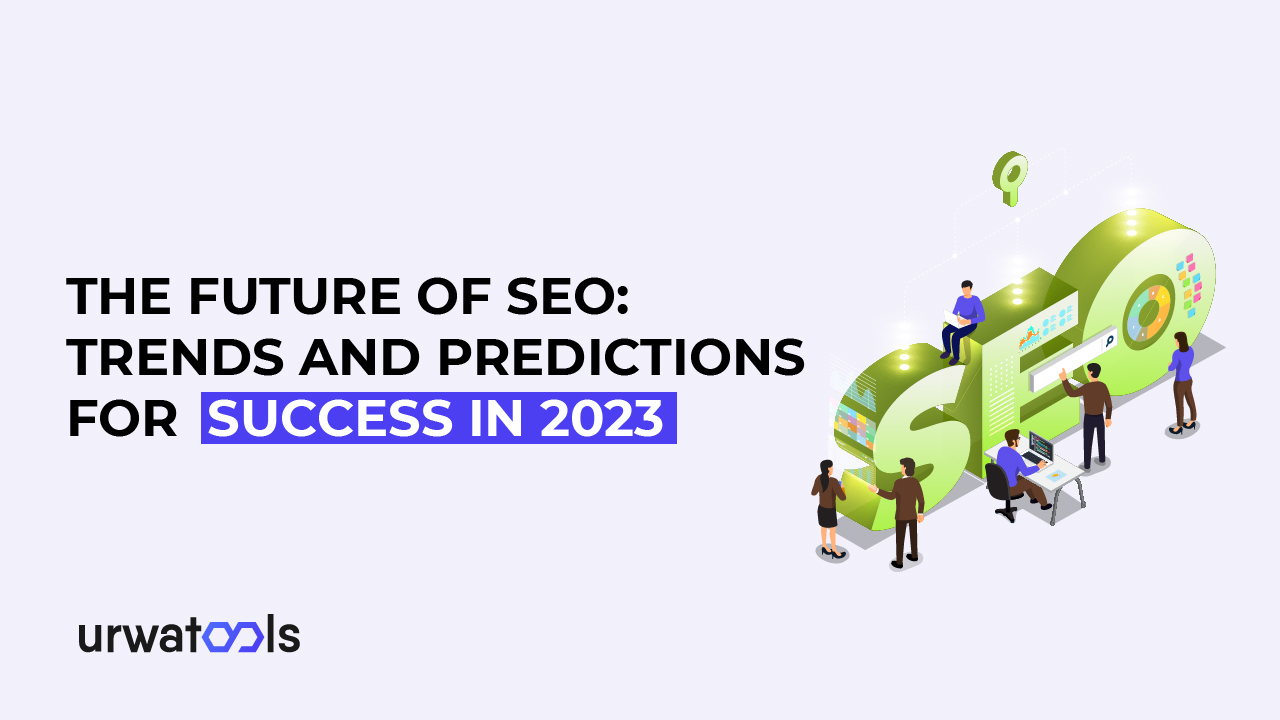Giới thiệu
Trong hệ sinh thái kỹ thuật số thay đổi nhanh chóng ngày nay, tối ưu hóa công cụ tìm kiếm (SEO) là rất quan trọng đối với lưu lượng truy cập trang web không phải trả tiền. Các công ty và nhà sản xuất nội dung phải cập nhật các xu hướng và dự báo mới nhất ảnh hưởng đến SEO vào năm 2023 và hơn thế nữa. Bài đăng này sẽ xem xét các lĩnh vực nhấn mạnh chính và dự đoán tương lai của SEO.
1. Sự phát triển của SEO
SEO, hoặc tối ưu hóa công cụ tìm kiếm, đã thay đổi đáng kể trong những năm qua. SEO đã phát triển từ những ngày đầu nhồi nhét từ khóa cơ bản đến trạng thái hiện tại của các thuật toán phức tạp và kỹ thuật lấy người dùng làm trung tâm. Bây giờ nó đóng một phần quan trọng trong khả năng hiển thị trực tuyến và sản xuất lưu lượng truy cập không phải trả tiền. Chúng tôi sẽ kiểm tra SEO đã phát triển như thế nào, ghi nhận các cột mốc quan trọng và thích nghi với một thế giới kỹ thuật số đang thay đổi.
I. Sự xuất hiện của các công cụ tìm kiếm:
Hành trình của SEO bắt đầu với các công cụ tìm kiếm. Các công cụ tìm kiếm như Archie, Gopher và Yahoo Directory xuất hiện vào đầu những năm 1990, cho phép người dùng định vị các trang web dựa trên các thư mục và danh sách được chọn thủ công. Trong giai đoạn này, chủ sở hữu trang web tập trung chủ yếu vào vị trí từ khóa bên trong nội dung của họ để tăng khả năng hiển thị kết quả tìm kiếm.
II. Sự ra đời của Google và tầm quan trọng của backlinks:
Môi trường SEO đã thay đổi đáng kể với sự ra mắt của Google vào năm 1998. Thuật toán PageRank của Google đã chuyển đổi cách xếp hạng kết quả tìm kiếm bằng cách xem xét mức độ liên quan của từ khóa và số lượng và chất lượng của các kết nối dẫn đến một trang. Kết quả là, backlinks được công nhận là một yếu tố xếp hạng quan trọng, khuyến khích chủ sở hữu trang web tập trung vào xây dựng liên kết và đạt được kết nối trong nước chất lượng cao.
III. Tối ưu hóa on-page và chất lượng nội dung:
Thực tiễn SEO phát triển với các công cụ tìm kiếm. Tối ưu hóa trên trang đã trở nên phổ biến, nhấn mạnh các yếu tố như thẻ meta, thẻ tiêu đề, mật độ từ khóa và chất lượng nội dung. Các nhà khai thác trang web nhận ra sự cần thiết phải tạo ra nội dung thú vị và có liên quan để thu hút người dùng và nâng cao thứ hạng tìm kiếm.
IV. Việc sử dụng ngày càng nhiều SEO mũ đen và cập nhật thuật toán:
Khi SEO phát triển, các hoạt động vô đạo đức được gọi là SEO mũ đen đã phát triển. Những chiến lược này đã tìm cách trò chơi các thuật toán công cụ tìm kiếm để có được lợi thế một cách nhanh chóng, dẫn đến trải nghiệm người dùng không hiệu quả. Do đó, các công cụ tìm kiếm bắt đầu thực hiện các sửa đổi thuật toán để phạt các hành vi đó và thưởng cho các trang web có nội dung chất lượng cao, thân thiện với người dùng.
V. Tối ưu hóa thiết bị di động và trải nghiệm người dùng:
Khi các thiết bị di động phát triển phổ biến hơn, các công cụ tìm kiếm ưu tiên các trang web thân thiện với thiết bị di động. Tối ưu hóa thiết bị di động đã trở nên quan trọng đối với hiệu suất SEO, bao gồm thiết kế đáp ứng, tốc độ tải nhanh và trải nghiệm web thân thiện với người dùng. Hơn nữa, các công cụ tìm kiếm bắt đầu đánh giá dữ liệu trải nghiệm người dùng như tỷ lệ thoát và thời gian trên trang làm tiêu chí xếp hạng.
VI. Ý định của người dùng và kỷ nguyên tìm kiếm ngữ nghĩa:
Sự nhấn mạnh của các công cụ tìm kiếm đã chuyển từ kết hợp từ khóa sang diễn giải ý định của người dùng. Tìm kiếm ngữ nghĩa, được kích hoạt bởi xử lý ngôn ngữ tự nhiên, cho phép các công cụ tìm kiếm hiểu ngữ cảnh và ý nghĩa của tìm kiếm của người dùng. Do sự thay đổi này, giờ đây việc cung cấp nội dung nhắm mục tiêu đến ý định của người dùng và cung cấp câu trả lời đầy đủ cho các câu hỏi của họ trở nên quan trọng hơn bao giờ hết.
VII. Cá nhân hóa và SEO địa phương:
Khi công nghệ tiên tiến, các công cụ tìm kiếm được cá nhân hóa kết quả tìm kiếm dựa trên sở thích và vị trí của người dùng. SEO địa phương trở nên quan trọng hơn khi các công ty tìm cách nhắm mục tiêu đến những người đang tìm kiếm các mặt hàng và dịch vụ trong khu vực ngay lập tức của họ. Tối ưu hóa tìm kiếm địa phương, bao gồm các từ khóa dựa trên vị trí, danh sách Google Doanh nghiệp của tôi và trích dẫn doanh nghiệp, đã trở nên quan trọng.
VIII. Tìm kiếm bằng giọng nói và dữ liệu có cấu trúc:
Với sự phát triển của trợ lý giọng nói và loa thông minh, một lớp SEO khác đã xuất hiện: tối ưu hóa tìm kiếm bằng giọng nói. Yêu cầu bằng giọng nói thường chi tiết hơn các yêu cầu trực tuyến, nhấn mạnh tầm quan trọng của việc tối ưu hóa trang web cho ngôn ngữ tự nhiên và từ khóa đuôi dài. Hơn nữa, việc tích hợp đánh dấu dữ liệu có cấu trúc, chẳng hạn như schema.org, đã trở nên quan trọng để cung cấp ngữ cảnh cho các công cụ tìm kiếm và cải thiện khả năng hiển thị nội dung trong các đoạn mã phong phú.
IX. AI và Machine Learning trong SEO:
Trí tuệ nhân tạo và học máy đã ảnh hưởng đáng kể đến việc tối ưu hóa công cụ tìm kiếm. Các thuật toán AI phân tích khối lượng dữ liệu khổng lồ, hiểu hành vi của người dùng và cung cấp kết quả tìm kiếm được cá nhân hóa. Học máy giúp các công cụ tìm kiếm cải thiện thuật toán của họ, tạo ra kết quả tìm kiếm chính xác và phù hợp hơn. Các chuyên gia SEO sử dụng công nghệ AI và ML để có được thông tin chi tiết, tối ưu hóa nội dung và tăng thứ hạng tìm kiếm.
X. E-A-T và SEO lấy người dùng làm trung tâm:
SEO lấy người dùng làm trung tâm là tiêu chuẩn trong những năm gần đây. Các trang web cung cấp trải nghiệm người dùng tuyệt vời, nội dung có thẩm quyền và thông tin đáng tin cậy được các công cụ tìm kiếm ưu tiên. Khái niệm về chuyên môn, thẩm quyền và độ tin cậy (E-A-T) đã trở nên phổ biến, thúc giục chủ sở hữu trang web phát triển kiến thức của họ, tạo ra thẩm quyền thông qua các liên kết ngược chất lượng và có được sự tin tưởng của người dùng thông qua nội dung minh bạch và đáng tin cậy.
2. Tối ưu hóa tìm kiếm bằng giọng nói
Trợ lý giọng nói và loa thông minh đã tăng tìm kiếm bằng giọng nói. Để duy trì tính cạnh tranh, các công ty phải tối ưu hóa tìm kiếm bằng giọng nói. Ví dụ bao gồm sử dụng ngôn ngữ đàm thoại, tổ chức tài liệu để trả lời các câu hỏi cụ thể và nhắm mục tiêu các từ khóa đuôi dài.
3. Trải nghiệm thân thiện với thiết bị di động
Các thiết bị di động đã vượt qua máy tính để bàn như là cách chính để kết nối với internet. Cung cấp trải nghiệm điện thoại thông minh nhất quán là rất quan trọng đối với hiệu suất SEO. Các công cụ tìm kiếm sẽ tiếp tục ưu tiên các trang web thân thiện với thiết bị di động với thời gian tải xuống nhanh, thiết kế đáp ứng và điều hướng đơn giản.
4. Trải nghiệm người dùng và Core Web Vitals
Là một yếu tố xếp hạng, các công cụ tìm kiếm đang ngày càng nhấn mạnh trải nghiệm người dùng. Core Web Vitals ảnh hưởng lớn đến SEO, chẳng hạn như tốc độ tải trang web, tính tương tác và sự ổn định thẩm mỹ. Tối ưu hóa trang web cho trải nghiệm người dùng tuyệt vời sẽ rất quan trọng trong tương lai.
5. Trí tuệ nhân tạo và Machine Learning
Trí tuệ nhân tạo (AI) và học máy (ML) là những công nghệ đột phá đã biến đổi một loạt các lĩnh vực, bao gồm tối ưu hóa công cụ tìm kiếm (SEO). Trong bài đăng này, chúng ta sẽ xem xét các nguyên tắc của AI và ML. Chúng tôi cũng sẽ xem xét cách chúng được sử dụng trong SEO và cách chúng ảnh hưởng đến tối ưu hóa nội dung và thứ hạng tìm kiếm.
I. Hiểu về Trí tuệ nhân tạo và Học máy:
Sự phát triển của các hệ thống máy tính có thể thực hiện các hoạt động thường đòi hỏi trí tuệ con người, chẳng hạn như nhận dạng giọng nói, ra quyết định và giải quyết vấn đề, là trí tuệ nhân tạo. Machine Learning, một tập hợp con của AI, đào tạo các thuật toán để học từ dữ liệu và dự đoán hoặc hành động mà không cần lập trình rõ ràng.
II. Ứng dụng của AI và ML trong SEO:
Công nghệ AI và ML đã góp phần vào SEO, cho phép các chiến lược tối ưu hóa chính xác và hiệu quả hơn. Dưới đây là một số ứng dụng chính.
1. Phân tích dữ liệu: AI và thuật toán học máy có thể phân tích khối lượng dữ liệu khổng lồ, chẳng hạn như hành vi của người dùng, xu hướng tìm kiếm và chỉ số hiệu suất trang web. Nghiên cứu này xác định các mẫu, xu hướng và thông tin chi tiết ảnh hưởng đến chiến lược SEO.
2. Hiểu ý định tìm kiếm: Các thuật toán được hỗ trợ bởi AI có thể nắm bắt tốt hơn ý định tìm kiếm của người dùng bằng cách phân tích ngữ cảnh và ý nghĩa của tìm kiếm. Thông tin chi tiết này cho phép các nhà cung cấp nội dung tối ưu hóa tài liệu của họ và cung cấp kết quả tìm kiếm phù hợp hơn.
3. Tạo và tối ưu hóa nội dung: Các giải pháp được hỗ trợ bởi AI có thể giúp tạo nội dung, tối ưu hóa từ khóa và thậm chí tạo nội dung tự động. Những công nghệ này sử dụng máy học để phân tích thông tin hiện tại và khám phá các xu hướng để cải thiện thứ hạng tìm kiếm.
4. Xử lý ngôn ngữ tự nhiên: Phương pháp học máy giúp các công cụ tìm kiếm diễn giải ngôn ngữ tự nhiên và các yêu cầu đàm thoại. Xử lý ngôn ngữ tự nhiên đặc biệt phù hợp với sự phát triển của tìm kiếm bằng giọng nói, trong đó người tiêu dùng tương tác với các công cụ tìm kiếm bằng ngôn ngữ nói.
5. Cá nhân hóa: Hệ thống AI điều chỉnh kết quả tìm kiếm cho từng người dùng tùy thuộc vào sở thích, lịch sử tìm kiếm và địa lý của họ. Cá nhân hóa làm tăng trải nghiệm người dùng và mức độ liên quan của tìm kiếm.
III. Cải thiện thứ hạng tìm kiếm với AI và ML:
1. Cải thiện mức độ liên quan của tìm kiếm: AI và thuật toán học máy giúp các công cụ tìm kiếm cung cấp kết quả tìm kiếm chính xác và phù hợp hơn. Công cụ tìm kiếm có thể cải thiện thứ hạng tìm kiếm bằng cách kết hợp tốt hơn các truy vấn với tài liệu có liên quan bằng cách phân tích sở thích, hành vi và ngữ cảnh của người dùng.
2. Tối ưu hóa trải nghiệm người dùng: AI và ML có thể đánh giá chất lượng và mức độ liên quan của trang web bằng cách phân tích dữ liệu hành vi người dùng như tỷ lệ thoát, thời gian trên trang và tỷ lệ nhấp. Trải nghiệm người dùng tích cực trên các trang web xếp hạng tốt hơn trong kết quả tìm kiếm.
3. Tiêu chí xếp hạng nâng cao: AI và học máy cho phép các công cụ tìm kiếm xem xét các tiêu chí xếp hạng phức tạp bên cạnh các tín hiệu cổ điển như liên kết ngược và tối ưu hóa từ khóa. Các yếu tố như sự tham gia của người dùng, chất lượng nội dung và tín hiệu xã hội được coi trọng hơn trong bảng xếp hạng tìm kiếm.
IV. Ý nghĩa tương lai của AI và ML trong SEO:
AI và ML trong SEO dự kiến sẽ mở rộng hơn nữa trong tương lai. Khi công nghệ phát triển, đây là một số ý nghĩa tiềm năng:
1. Tối ưu hóa tìm kiếm bằng giọng nói: Khi trợ lý giọng nói và loa thông minh trở nên phổ biến hơn, việc tối ưu hóa nội dung tìm kiếm bằng giọng nói sẽ ngày càng trở nên quan trọng. AI (Trí tuệ nhân tạo) và học máy rất quan trọng trong việc hiểu và trả lời các câu hỏi của người dùng ngôn ngữ tự nhiên.
2. Cá nhân hóa và lấy người dùng làm trung tâm: Các thuật toán AI cá nhân hóa kết quả tìm kiếm dựa trên lựa chọn của người dùng, dẫn đến trải nghiệm tìm kiếm được cá nhân hóa và phù hợp hơn. Các phương pháp SEO lấy người dùng làm trung tâm nhấn mạnh nội dung được cá nhân hóa đáp ứng nhu cầu của người dùng cá nhân.
3. Cập nhật và điều chỉnh thuật toán: Khi các công cụ tìm kiếm tiếp tục nâng cao thuật toán của họ, AI và ML sẽ giúp các học viên SEO thích nghi với những thay đổi này. Các thuật toán ML có thể ngay lập tức phân tích các tiêu chí xếp hạng được cập nhật và tối ưu hóa chiến thuật để đáp ứng.
4. Tự động hóa và hiệu quả: Các công cụ hỗ trợ AI tự động hóa các tác vụ SEO khác nhau, chẳng hạn như nghiên cứu từ khóa, tối ưu hóa nội dung và phân tích hiệu suất. Việc tự động hóa này sẽ tiết kiệm thời gian và nguồn lực đồng thời nâng cao hiệu quả SEO.
6. Đoạn trích nổi bật và tìm kiếm không nhấp chuột
Đoạn trích nổi bật là những câu trả lời ngắn cho các câu hỏi của người dùng trên trang kết quả của công cụ tìm kiếm. Những đoạn trích này dẫn đến các tìm kiếm không nhấp chuột, nơi khách truy cập khám phá thông tin họ muốn mà không cần điều hướng trang web. Tối ưu hóa nội dung cho các đoạn trích được đánh dấu có thể tăng khả năng hiển thị và lưu lượng truy cập.
7. Nội dung SEO và Video
Nội dung video đã trở nên phổ biến kỹ thuật số, cung cấp cho người tiêu dùng những trải nghiệm hấp dẫn và năng động. Về tối ưu hóa công cụ tìm kiếm (SEO), bao gồm nội dung video trong cách tiếp cận của bạn có thể có lợi. Chúng tôi sẽ kiểm tra mối liên hệ giữa nội dung video và SEO, tập trung vào cách nó ảnh hưởng đến thứ hạng tìm kiếm và mức độ tương tác của người dùng.
I. Tác động của nội dung video đối với mức độ tương tác của người dùng:
1. Cải thiện trải nghiệm người dùng: Nội dung video làm cho trải nghiệm người dùng năng động và hấp dẫn hơn về mặt thẩm mỹ. Nó có thể truyền tải thông tin, khơi gợi cảm xúc và thu hút sự chú ý, tăng mức độ tương tác của người dùng.
2. Tăng thời gian trên trang: Video hấp dẫn có thể giữ chân mọi người trên trang web của bạn lâu hơn, tăng thời gian trung bình dành cho một trang. Các công cụ tìm kiếm coi đây là một chỉ số đáng tin cậy về sự hài lòng của người dùng, dẫn đến thứ hạng tìm kiếm cao hơn.
II. Tối ưu hóa video cho SEO:
1. Tiến hành nghiên cứu từ khóa sâu rộng để khám phá các từ khóa và cụm từ có liên quan được kết nối với nội dung video của bạn. Kết hợp các từ khóa này một cách tự nhiên vào tiêu đề, mô tả và thẻ video của bạn.
2. Siêu dữ liệu video: Lưu ý siêu dữ liệu được liên kết với video của bạn, chẳng hạn như tiêu đề, mô tả và thẻ. Tối ưu hóa các phần này bằng cách sử dụng các từ khóa có liên quan và đảm bảo chúng phản ánh thích hợp nội dung của video.
3. Bản chép lời và Phụ đề: Cung cấp bản chép lời và phụ đề chi tiết cho video của bạn. Các công cụ tìm kiếm có thể thu thập thông tin dựa trên văn bản, tăng khả năng khám phá nội dung video và khả năng truy cập.
4. Sơ đồ trang web dành cho video: Gửi sơ đồ trang web dành cho video cho các công cụ tìm kiếm. Sơ đồ trang web dành cho video cung cấp thông tin quan trọng về nội dung video của bạn cho các công cụ tìm kiếm, chẳng hạn như tiêu đề, mô tả và URL của video.
III. Backlinks và chia sẻ xã hội:
1. Liên kết ngược: Nội dung video hấp dẫn có nhiều khả năng nhận được backlink từ các trang web khác. Bởi vì backlinks là một yếu tố xếp hạng quan trọng cho các công cụ tìm kiếm, có các liên kết chất lượng cao và có liên quan đến video của bạn có thể giúp chúng xuất hiện cao hơn trong kết quả tìm kiếm.
2. Khuyến khích người tiêu dùng chia sẻ phim của bạn trên các mạng truyền thông xã hội. Tăng chia sẻ xã hội có thể tăng lượt xem, sự tham gia và các liên kết ngược mới.
IV. Tối ưu hóa video trên thiết bị di động:
1. Thiết kế đáp ứng: Đảm bảo trình phát video và trang web của bạn thân thiện với thiết bị di động. Thiết kế đáp ứng giúp xem và duyệt phim trên điện thoại thông minh và máy tính bảng, mang lại trải nghiệm người dùng liền mạch.
2. Tốc độ tải trang: Tối ưu hóa các tệp video của bạn để tải di động nhanh hơn. Video tải chậm có thể tác động tiêu cực đến trải nghiệm người dùng, dẫn đến tỷ lệ thoát cao hơn và thứ hạng tìm kiếm thấp hơn.
V. SEO YouTube và video:
1. SEO YouTube: YouTube là công cụ tìm kiếm lớn thứ hai sau Google. Sử dụng các từ khóa có liên quan trong tiêu đề, mô tả và thẻ để tối ưu hóa video của bạn cho YouTube và thúc đẩy mức độ tương tác thông qua lượt thích, nhận xét và đăng ký.
2. Nhúng video: Bao gồm video YouTube trên trang web của bạn có thể tăng mức độ tương tác của người dùng và tăng cơ hội tối ưu hóa công cụ tìm kiếm. Đảm bảo phim bạn nhúng có liên quan và mang lại giá trị cho trang web của bạn.
8. Tiếp thị người ảnh hưởng và SEO
Tiếp thị người ảnh hưởng đã phát triển thành một công cụ mạnh mẽ cho các doanh nghiệp đang tìm cách tiếp cận nhân khẩu học mục tiêu của họ. Hợp tác với những người có ảnh hưởng có thể cải thiện hiệu suất SEO bằng cách tăng khả năng hiển thị thương hiệu, tạo ra các liên kết ngược chất lượng cao và tăng tín hiệu xã hội.
9. SEO cho doanh nghiệp địa phương
Tìm kiếm của công cụ tìm kiếm đang tăng lên, với những người khám phá các mặt hàng và dịch vụ gần đó. Tối ưu hóa SEO địa phương bao gồm phát triển danh sách Google Doanh nghiệp của tôi, đạt được trích dẫn kinh doanh và tạo ra các đánh giá thuận lợi. Các công ty xã phải ưu tiên SEO địa phương để tương tác hiệu quả với đối tượng mục tiêu của họ.
10. E-A-T và chất lượng nội dung
E-A-T và chất lượng nội dung
Chuyên môn, thẩm quyền và đáng tin cậy (E-A-T) rất quan trọng trong việc đánh giá tối ưu hóa công cụ tìm kiếm (SEO) và chất lượng nội dung. Chúng ta sẽ thảo luận về tầm quan trọng của E-A-T trong SEO và cách nó ảnh hưởng đến chất lượng nội dung tổng thể.
I. Hiểu về E-A-T:
1. Kiến thức, khả năng và thông tin đăng nhập mà nhà cung cấp nội dung hoặc trang web cung cấp thông tin sở hữu được gọi là chuyên môn. Nó chỉ ra rằng các cá nhân hoặc tổ chức phát triển tài liệu với kiến thức kỹ lưỡng về chủ đề này.
2. Tính có thẩm quyền: Tính có thẩm quyền cho biết danh tiếng và thẩm quyền của người tạo nội dung hoặc trang web trong một chủ đề hoặc lĩnh vực. Nó chỉ ra rằng thông tin được trình bày là đáng tin cậy, chính xác và đáng tin cậy.
3. Độ tin cậy: Độ tin cậy chỉ ra rằng nhà sản xuất nội dung hoặc trang web đơn giản, đáng tin cậy và trung thực trong việc trình bày thông tin của mình. Người dùng nên tin tưởng nội dung với sự trung thực và chính trực.
II. E-A-T và SEO:
1. Thuật toán công cụ tìm kiếm: Các công cụ tìm kiếm như Google ưu tiên tài liệu có lượng E-A-T cao. Các trang web có nội dung có thẩm quyền và đáng tin cậy có cơ hội xếp hạng hàng đầu trong kết quả tìm kiếm tốt hơn. E-A-T là một chỉ số chất lượng được sử dụng bởi các thuật toán của công cụ tìm kiếm.
2. Trang YMYL: E-A-T đặc biệt quan trọng đối với các trang "Tiền của bạn hoặc Cuộc sống của bạn" (YMYL), bao gồm các chủ đề về sức khỏe, kinh tế và pháp lý. E-A-T rất quan trọng trong việc xác định tính hợp pháp vì các trang như vậy có thể ảnh hưởng đáng kể đến sức khỏe của người dùng.
III. Các yếu tố ảnh hưởng đến E-A-T:
1. Chất lượng vật liệu: Tài liệu được nghiên cứu kỹ lưỡng, kỹ lưỡng và chính xác làm tăng thêm năng lực, thẩm quyền và độ tin cậy. Nó nên coi trọng cuộc sống của người tiêu dùng bằng cách giải quyết mong muốn và câu hỏi của họ.
2. Người đóng góp chuyên gia: Bao gồm đóng góp từ các chuyên gia được công nhận trong chủ đề này giúp nâng cao kiến thức và thẩm quyền nhận thức của nội dung. Quan điểm và ý kiến của chuyên gia cho vay tính hợp pháp và chiều sâu cho tài liệu được cung cấp.
3. Nguồn và tài liệu tham khảo đáng tin cậy: Trích dẫn các nguồn và tài liệu tham khảo đáng tin cậy sao lưu các khẳng định nội dung và thông tin. Nó chứng minh rằng tài liệu dựa trên thông tin đáng tin cậy và đáng tin cậy từ các nguồn đáng tin cậy.
IV. Tăng cường E-A-T:
1. Thể hiện kiến thức: Thể hiện kiến thức của người sáng tạo nội dung hoặc trang web thông qua bằng cấp, chứng chỉ, sự công nhận trong ngành và kinh nghiệm chuyên môn. Làm nổi bật các bằng cấp liên quan hỗ trợ trong việc thiết lập uy tín.
2. Có được các liên kết ngược có thẩm quyền: Có được các liên kết ngược từ các trang web có thẩm quyền và đáng tin cậy giúp cải thiện thẩm quyền và danh tiếng nội dung. Nó cho thấy rằng các nguồn đáng tin cậy khác nhận ra chất lượng và giá trị của nội dung.
3. Phản hồi và đánh giá của người dùng: Phản hồi, lời chứng thực và đánh giá tích cực của người dùng có thể nâng cao độ tin cậy nhận thức của nội dung. Khuyến khích sự tham gia của người dùng và trả lời các câu hỏi và mối quan tâm của người dùng để xây dựng lòng tin.
11. Blockchain và SEO
Công nghệ Blockchain có khả năng cách mạng hóa tiếp thị kỹ thuật số, bao gồm cả SEO. Thiết kế phi tập trung và mở của nó có thể trả lời các vấn đề về tính toàn vẹn dữ liệu, bảo mật và quyền riêng tư. Khi công nghệ blockchain tiến bộ, ảnh hưởng của nó đối với thực tiễn SEO sẽ trở nên rõ ràng hơn.
12. Quyền riêng tư và bảo mật dữ liệu
Với những lo ngại về quyền riêng tư ngày càng tăng, các công cụ tìm kiếm và người dùng ưu tiên trải nghiệm trực tuyến an toàn. Các trang web bảo mật dữ liệu và tuân theo các tiêu chuẩn bảo mật sẽ có lợi thế cạnh tranh trong tương lai. Duy trì sự tự tin của người dùng và các quy trình bảo mật là rất quan trọng đối với SEO.
13. Thực tế tăng cường và thực tế ảo
Khi công nghệ AR và VR trở nên phổ biến rộng rãi hơn, các tùy chọn SEO mở rộng. Tối ưu hóa nội dung thực tế ảo và tăng cường có thể làm tăng mức độ tương tác của người dùng và mang lại trải nghiệm nhập vai. Các doanh nghiệp bao gồm thực tế tăng cường và thực tế ảo trong chiến thuật SEO của họ sẽ nổi bật trong tương lai.
14. Kết luận
Tương lai của SEO là năng động và luôn thay đổi. Luôn cập nhật các xu hướng và dự báo mới nhất là rất quan trọng đối với các doanh nghiệp và nhà sản xuất nội dung đang tìm kiếm thành công SEO vào năm 2023 và hơn thế nữa. Các tổ chức có thể định vị mình để phát triển lâu dài trong hệ sinh thái kỹ thuật số bằng cách áp dụng công nghệ đang phát triển, ưu tiên trải nghiệm người dùng và cung cấp nội dung chất lượng cao.







